Samsung SSD 850 Pro (128GB, 256GB & 1TB) Review: Enter the 3D Era
by Kristian Vättö on July 1, 2014 10:00 AM ESTRandom Read/Write Speed
The four corners of SSD performance are as follows: random read, random write, sequential read and sequential write speed. Random accesses are generally small in size, while sequential accesses tend to be larger and thus we have the four Iometer tests we use in all of our reviews.
Our first test writes 4KB in a completely random pattern over an 8GB space of the drive to simulate the sort of random access that you'd see on an OS drive (even this is more stressful than a normal desktop user would see). We perform three concurrent IOs and run the test for 3 minutes. The results reported are in average MB/s over the entire time.
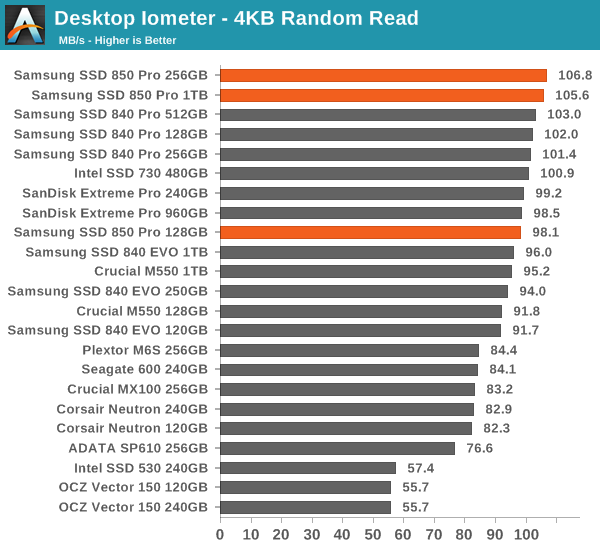
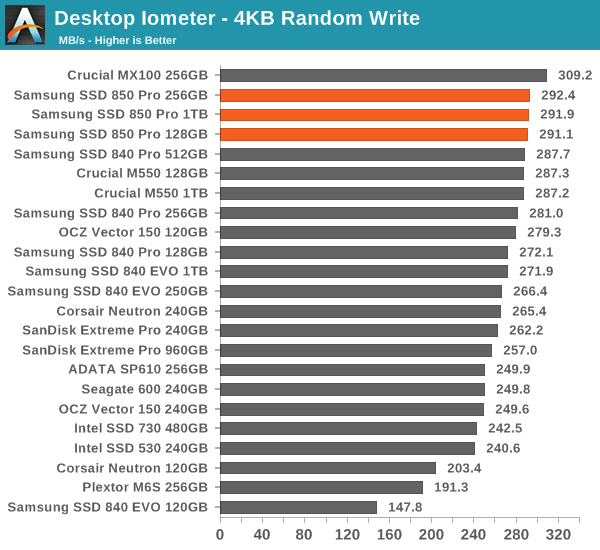
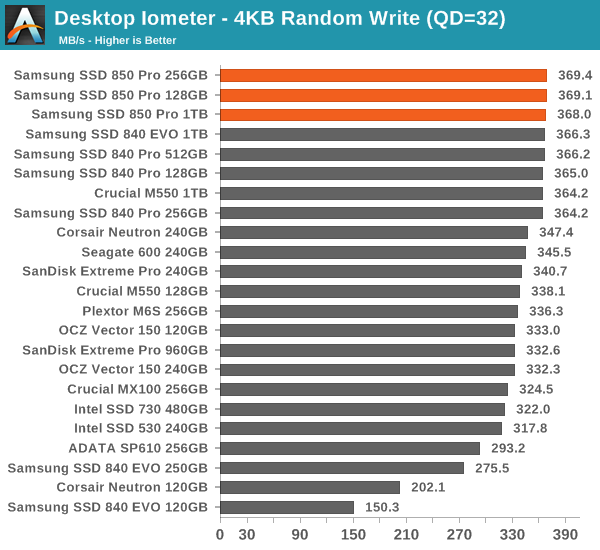
Random performance is also brilliant and the 850 Pro tops almost all of our benchmarks. It is no wonder why it is so fast in the Storage Benches.
Sequential Read/Write Speed
To measure sequential performance we run a 1 minute long 128KB sequential test over the entire span of the drive at a queue depth of 1. The results reported are in average MB/s over the entire test length.
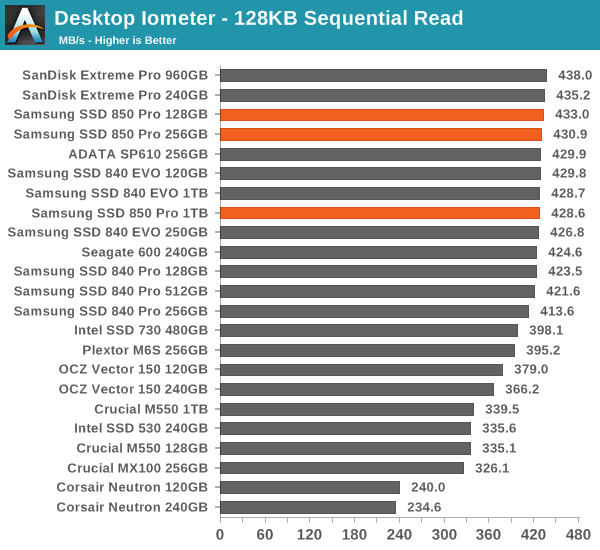
The same goes for sequential speeds. Of course, the differences are not substantial but nevertheless the 850 Pro is fast.
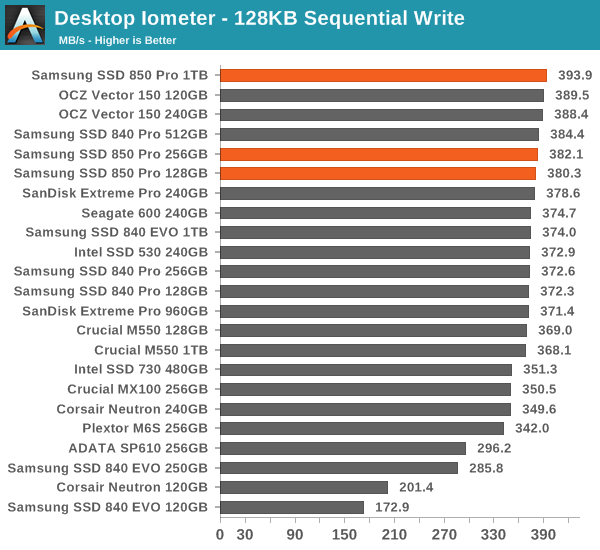
AS-SSD Incompressible Sequential Read/Write Performance
The AS-SSD sequential benchmark uses incompressible data for all of its transfers. The result is a pretty big reduction in sequential write speed on SandForce based controllers, but it doesn't impact most of the other controller much if at all.
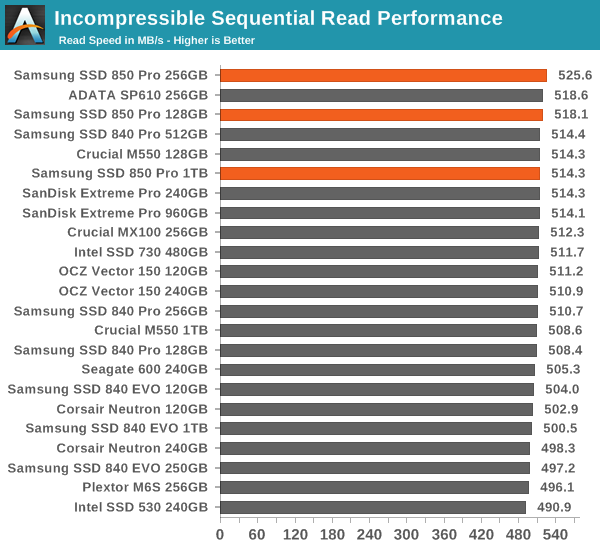
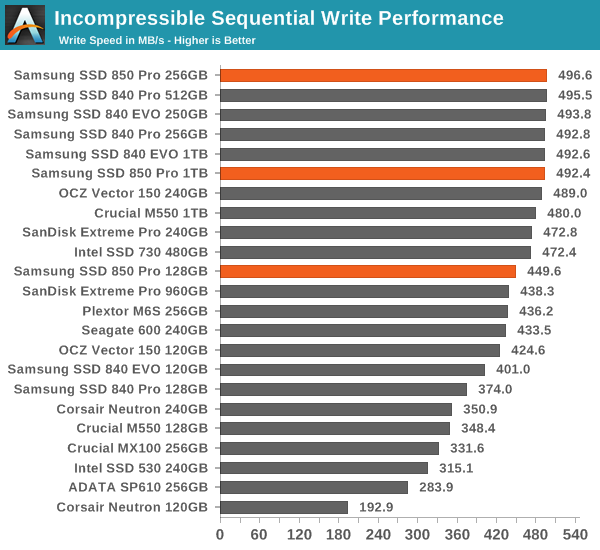










160 Comments
View All Comments
extide - Tuesday, July 1, 2014 - link
Well, kinda, I mean, some implementations come from the IOH instead of the CPU. I have heard rumors that future versions of Intel Desktop CPU's will have 20-24 PCIE lanes on them instead of 16. That would be perfect for storage!smithrd3512 - Tuesday, July 1, 2014 - link
Gotta love that warranty. 10 years on the drive. Might be worth the extra cost just for that alone.rahuldesai1987 - Tuesday, July 1, 2014 - link
"That is very aggressive because it essentially implies that the die capacity will double every year (256Gbit next year, 512Gbit in 2016 and finally 1Tbit in 2017)" - Does this mean a 8TB drive at $600 in 2017 ($75 per TB). Good bye hard drives by then :). What about a 850/850 Evo version?DarkXale - Tuesday, July 1, 2014 - link
It certainly does imply 8TB SSDs by 2017. By that point such a SSD will likely have a higher capacity than HDDs of that time.Of course, price will be very significantly in favour of the HDD still; but if money is no object you could do bulk storage in a portable device if you wanted to.
CalaverasGrande - Tuesday, July 1, 2014 - link
This may become an exhibit in some future dispute between Samsung and Apple. Those prices are easily Apple territory.extide - Tuesday, July 1, 2014 - link
Ehh, those prices were par for the course 18-24+ months ago!toyotabedzrock - Tuesday, July 1, 2014 - link
Does the height of these 32 layers make the cells more delicate when subjected to horizontal movement?And is this mlc or TLC?
MrSpadge - Wednesday, July 2, 2014 - link
Do, it doesn't. The height scale is still in the µm range, which is pretty much stable on macroscopic sclaes.emvonline - Tuesday, July 1, 2014 - link
thanks for the article on VNAND SSD. I think the SSD analysis is good and shows the impact. The details of Planar NAND and VNAND are incorrect in many cases. The overall NAND takeaway should be Samsung VNAND is a 86Gbit device Die level with a very large effective cell size. I still want to buy one... where can I get it?Kristian Vättö - Tuesday, July 1, 2014 - link
"The details of Planar NAND and VNAND are incorrect in many cases."Can you elaborate on that? I'm not saying that there can't be mistakes but it doesn't help me unless you explain what you think is incorrect.